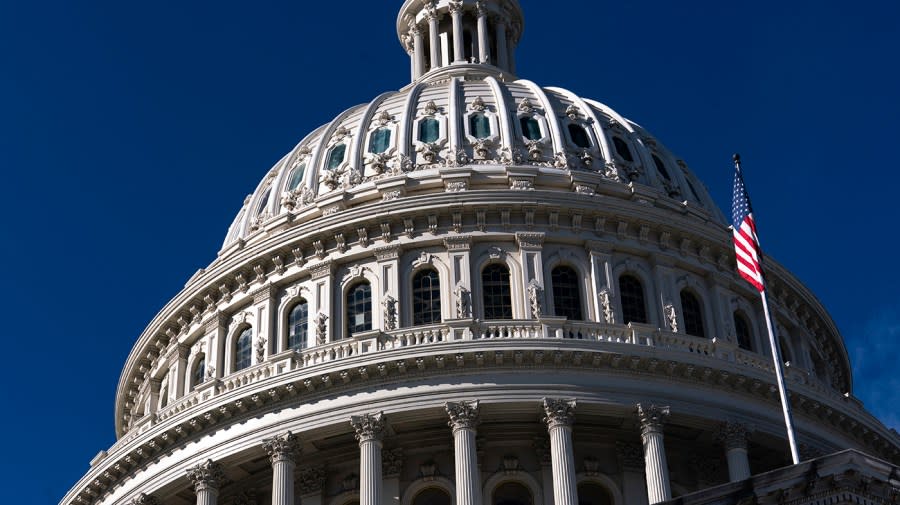House passes short-term funding bill to avert shutdown

The House on Thursday approved a short-term funding bill to avert a partial government shutdown this weekend, sending the legislation to the Senate one day before Friday’s funding deadline.
The legislation — which cleared the chamber in a 320-99 vote — kicks the two government funding deadlines to March 8 and March 22, buying lawmakers more time to hash out their differences on spending bills and push them over the finish line.
Trouble, however, could loom ahead.
While lawmakers say they have a deal on the six appropriations bills due next week, disagreements remain on the other half-dozen measures, which include more controversial pieces of legislation funding agencies like the Pentagon and the Department of Homeland Security.
“Clearly the second group of bills could be difficult and problematic, especially as Republicans in the House continue to insist on policy riders that erode women’s reproductive freedom,” Rep. Pete Aguilar (Calif.), chair of the Democratic Caucus, said shortly before the vote.
In the near-term, the continuing resolution keeps the government running and lends a small victory for Speaker Mike Johnson (R-La.) who is fighting to avoid a shutdown, which would be blamed on House Republicans who have demanded controversial policy additions to funding bills.
But it puts him on thin ice with members of the right flank, who abhor short-term spending bills and are becoming fed up with his propensity to put continuing resolutions on the floor that pass with Democratic support — as was the case Thursday.

Speaker Mike Johnson (R-La.) addresses reporters after a closed-door House Republican Conference meeting on Thursday, February 29, 2024. (Greg Nash)
Only 113 Republicans voted for the bill, compared to 207 Democrats, though slightly more than half the GOP conference voted in favor. Only two Democrats — Reps. Jake Auchincloss (Mass.) and Mike Quigley (Ill.) — voted no.
Thursday’s vote marked the fourth stopgap bill the chamber has cleared this Congress, and it’s the third under the Louisiana Republican’s leadership.
To bypass the conservative opposition, Johnson brought the legislation to the floor under suspension of the rules, a fast-track process that requires two-thirds support for passage but eliminates the need to approve a procedural rule, which conservatives likely would have tanked.
It’s a maneuver that helped lead to the ouster of former Speaker Kevin McCarthy (R-Calif.) — who lost the gavel in September after passing a short-term spending bill with help from Democrats.
But Johnson’s job appears safe for the time being. Conservatives were quick to voice their opposition to the spending bill Thursday, but would not go as far as to vow retribution for the top Republican.
“Here we are again, kicking the can down the road,” Rep. Chip Roy (R-Texas) said on the House floor Thursday. “Buy more time so we can spend more money that we don’t have.”
Asked earlier in the day if Johnson should face consequences for moving the short-term spending bill, Roy responded: “I’m not gonna talk about that,” adding “consequences are gonna be that people are gonna lose faith in the Republican Party.”
Top Stories from The Hill
E. Jean Carroll expresses ‘very serious concerns’ Trump won’t pay $83M judgment
Head of Freedom Caucus bashes funding deal, vows shutdown fight
Ex-divorce lawyer’s testimony complicates Willis, Wade controversy
White House demands Fox News retract coverage of bribery allegations against Hunter Biden, president
Under the agreement congressional leaders struck this week, the six appropriations bills that fund military construction, water development, the Food and Drug Administration and the departments of Agriculture, Commerce, Justice, Energy, Interior, Veterans Affairs, Transportation and Housing and Urban development are due March 8.
The remaining six measures — funding the financial services, general government, the legislative branch, state and foreign operations and the departments of Defense, Homeland Security, Labor and Health and Human Services — are due March 22.
Leadership said negotiators have an agreement on the six bills coming down the pike next week, and Johnson said Thursday the package will be made public this weekend to give members enough time to review the text ahead of a vote next week.
But senior appropriators have signaled there could still be some loose ends to iron out before text is released.
Rep. Rosa DeLauro (Conn.), the top Democrat on the House Appropriations Committee, told reporters Wednesday evening that “there’s still one or two pieces” to hammer out, including unresolved items in areas like the Special Supplemental Nutrition Program for Women, Infants, and Children and Supplemental Nutrition Assistance Program benefits, as well as gun-related snags.
Conservative Republicans are pushing to include a host of conservative policy priorities in the funding bills, but GOP leadership has sought to temper expectations ahead of the rollout, warning members not to expect any “home runs.”
In remarks to reporters Thursday, Sen. Lisa Murkowski (Alaska), top Republican on the subcommittee that hashes out dollars for the Department of the Interior and the environment, said “there were a couple final remaining things” on her subpanel’s bill that top negotiators “were dealing with.”
“But I can tell you that the vast, vast, vast majority, the overwhelming majority of the riders that the House had wanted to try to advance, we just weren’t able to accommodate,” Murkowski told reporters Thursday. “We’re trying to get a bill.”
Some of the measures Republicans sought as part of their Interior funding bill could create more opportunities to drill offshore and on public lands, while also targeting the Biden administration’s environmental rules.
The party’s initial proposal also included language taking aim at the administration’s executive orders on diversity, as the party has pressed for a list of riders in thorny areas like abortion and critical race theory — an academic framework evaluating U.S. history through the lens of racism that has become a political catch-all buzzword for any race-related teaching — that have drawn the ire of Democrats.
But that doesn’t mean rank-and-file Republicans are holding their breath for major conservative policy wins.
“We’ll get text with enough time to read it. We’ll get the 72 hours cleared, but I’m not anticipating any big wins,” Rep. Kat Cammack (R-Fla.) said Thursday. “So, I anticipate probably 100 Republicans voting against.”
Mike Lillis contributed.
For the latest news, weather, sports, and streaming video, head to The Hill.


